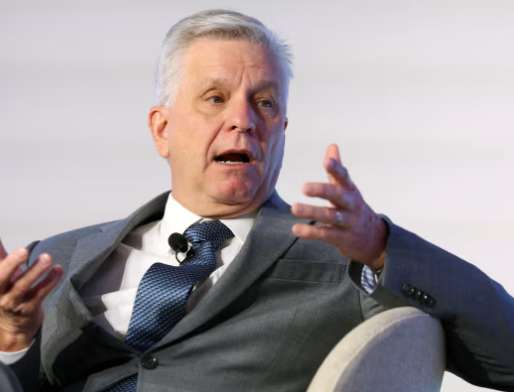Fed's Waller: Ethereum and Stablecoins Are the Next Step in Payments Development, Institutions Should Adopt
Christopher Waller, a top contender for the next Federal Reserve Chair and a current Fed Governor, delivered a significant speech openly expressing optimism toward digital assets, especially Ethereum
 Christopher Waller, a top contender for the next Federal Reserve Chair and a current Fed Governor, delivered a significant speech openly expressing optimism toward digital assets, especially Ethereum and stablecoins, noting positive progress on the GENIUS Act. This is seen as providing crucial policy support for the institutional adoption of stablecoins and Ethereum.
Christopher Waller, a top contender for the next Federal Reserve Chair and a current Fed Governor, delivered a significant speech openly expressing optimism toward digital assets, especially Ethereum and stablecoins, noting positive progress on the GENIUS Act. This is seen as providing crucial policy support for the institutional adoption of stablecoins and Ethereum.
On Thursday, Waller publicly praised Ethereum and stablecoins as the natural next step in payment technology development, stating that smart contracts, tokenization, and distributed ledgers do not pose risks in everyday use. He urged financial institutions to adopt cryptocurrencies as part of the natural progression of payment systems.
Regarding regulation, Waller referred to the GENIUS Act as a "good start" and pledged to address existing issues gradually as the process moves forward.
Waller's stance endorsing Ethereum and stablecoins as foundational financial infrastructure aligns with key regulatory legislation passed in 2025. This statement has been interpreted by the market as a positive signal for the revaluation of cryptocurrencies.
The GENIUS Act requires stablecoin issuers to hold 1:1 reserves in high-quality liquid assets, while the CLARITY Act clarifies the regulatory framework for digital commodities, eliminating regulatory uncertainty for institutional investors.
The GENIUS Act took effect in July 2025, establishing the first federal regulatory framework for stablecoins in the United States.
The Act requires stablecoin issuers to hold high-quality liquid assets such as U.S. Treasury bonds and cash as 1:1 reserves and clarifies the supervisory roles of banking regulators such as the OCC and FDIC.
Complementing the GENIUS Act, the CLARITY Act, passed by the House of Representatives in July 2025, further delineates the jurisdictional boundaries between the SEC and CFTC.
The Act classifies non-stablecoin assets such as Bitcoin and Ethereum as "digital commodities" regulated by the CFTC, eliminating regulatory ambiguity for asset management firms and institutional investors.
This dual legislative framework has created a favorable environment for institutional adoption, driving rapid growth in Ethereum-based tokenized assets and ETFs.
Regulatory clarity has directly contributed to increased institutional investment in Ethereum and stablecoins.
As of Q3 2025, Ethereum ETFs have reached $27.6 billion in assets under management, with inflows surpassing those of Bitcoin ETFs. BlackRock's ETHA ETF attracted $10 billion in assets under management within just ten days of its launch.
Corporate capital has also been reallocated to the Ethereum ecosystem, with over 64 companies investing $10.1 billion in staking and tokenized real-world assets.
Platforms such as BlackRock's BUIDL and Franklin Templeton's Progmat are leveraging Ethereum's infrastructure to offer fractional ownership of assets, merging traditional finance with blockchain programmability.
Ethereum's technical upgrades have further enhanced its appeal to institutional investors. Following the completion of the Pectra and Dencun upgrades, Ethereum's gas fees (transaction costs) have decreased by 90%.
The reduction in fees has directly lowered the cost of running decentralized finance (DeFi) applications on Ethereum, attracting more institutional capital. The total value locked (TVL) in DeFi has reached $223 billion, with substantial funds flowing into decentralized financial products such as lending, staking, and liquidity pools.
Ethereum's dominant position in the stablecoin ecosystem has strengthened, with stablecoins issued and circulating on Ethereum accounting for 50% of the global market share.
Disclaimer: The views in this article are from the original Creator and do not represent the views or position of Hawk Insight. The content of the article is for reference, communication and learning only, and does not constitute investment advice. If it involves copyright issues, please contact us for deletion.